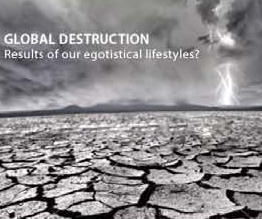Less than 82 months and counting...the beginning of the end of the world
 The world is not run according to climate science. Amid the almost hysterical jeering since the Copenhagen climate summit, it’s a fact worth remembering. If things were done with one eye carefully checking the planet’s ecological engines and the resource levels in its fuel tank, it would look very different The largest indoor snow park in the world would not, for example, be in the roasting Middle Eastern emirate of Dubai. Public transport would be quick and cheap, and Richard Branson would be an unknown gardener, quietly cycling back and forth to his organically-run allotment.
The world is not run according to climate science. Amid the almost hysterical jeering since the Copenhagen climate summit, it’s a fact worth remembering. If things were done with one eye carefully checking the planet’s ecological engines and the resource levels in its fuel tank, it would look very different The largest indoor snow park in the world would not, for example, be in the roasting Middle Eastern emirate of Dubai. Public transport would be quick and cheap, and Richard Branson would be an unknown gardener, quietly cycling back and forth to his organically-run allotment.Yet fear of the likely adjustments needed to halt dangerous climate change seems to fuel the vitriol of the vociferous minority attacking climate science. It’s odd when you think what those changes might be. A cartoon currently going around sums it up. An academic-type gives a lecture, listing the outcomes of climate action: energy independence, clean water, clean air, green jobs, liveable cities, healthy children etc etc, while a man in the audience blusters, “But what if it’s a big hoax and we create a better world for nothing?”
And, it’s not, of course, a hoax. The basic chemistry of global warming has been understood and remained unchanged for around 200 years. Stories concerning the science in recent weeks have been of the type, “how long can you hold your breath?” Not “can we actually breathe underwater?” At the same time, observed trends on greenhouse gas emissions, measured since the last major report by the Intergovernmental Panel on Climate Change (IPCC), reveal the opposite of scaremongering.
If anything, the IPCC has been too conservative, having underestimated how quickly we would be pushed toward dangerous change. Actual carbon emissions have been beyond even their “most fossil-fuel-intensive scenario”. Crowing over the inclusion in its last report of an erroneous date for the melting of Himalayan glaciers drowned out a new report from the World Glacier Monitoring Service, that detailed an “unbroken acceleration in melting” of glaciers around the world.
Sadly, right now, the climate change deniers have little to fear. We have no policies or actions remotely equal to the threat. Why is that? It is partly because the world is not run in respect of basic, well-understood physical laws. It is run according to the dictates of an altogether more variable discipline, economics, whose insights and proposals are subject to a weaker scrutiny. The real world ticks reliably according to the laws on thermodynamics and the conservation of energy. Such consistency cannot be claimed for the notion that a deregulated, greed-driven approach is the most efficient way to organise banking. But what if economic policy was subject to the same standard of evidence and review as climate science?
What would natural science make of the assumptions underlying mainstream economic models? They include the classic assertions that we are all perfectly rational, make choices that are unaffected by the behaviour of others, and that we have “perfect information”, knowing everything important there is to know. Or there’s the one in which an infinite number of small firms compete in open markets with no barriers to entry (think Walmart, Microsoft, Amazon, Tesco, Google). And the idea that consumption can grow infinitely on a finite planet.
Orthodox economics is based on simplifications that so distort the real world as to make it unrecognisable, yet its basic tenets are credulously repeated on an almost daily basis in national newspapers and on television news. A genuinely evidence-based approach to economic policymaking would not produce a system remotely like the one we have, the business-as-usual version that many climate sceptics seem so eager to defend. Given its task, the vast range of subjects covered, the thousands of scientists involved, and the sheer size of its reports, what’s stunning about the IPCC’s work is that comparing it to any economic analysis used to actually run the world is like comparing the complete Oxford English Dictionary to a guide to slang published by the Sunday Sport.
Elsewhere, some voices have called for there to be a separate climate sceptics’ report. On one hand, this misses the point. If the sceptics’ science was good enough to be published in decent, peer-reviewed journals, it would be considered alongside everything else by the IPCC. But on the other hand, subjecting the deniers to the same degree of rigorous review as everyone else is a rather delicious prospect. If that was done, the final report would likely be short indeed.
And, on current trends, it is still the case that by the end of the year 2016, the amount of greenhouse gases in the atmosphere will make it unlikely that we’ll stay below the critical 2°C temperature rise. It’s 82 months and counting…
By: Andrew Simms
You can return to the main Market News page, or press the Back button on your browser.

